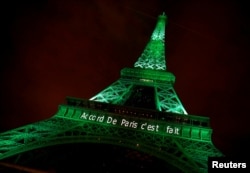U.N. Secretary-General António Guterres warned Thursday that climate change was moving faster than international efforts to mitigate it.
"It is important that we tackle climate change with much greater ambition," Guterres told reporters at the launch of a World Meteorological Organization (WMO) annual report on the subject.
The report warns that key climate change indicators are becoming more pronounced.
Levels of carbon dioxide — a main driver of global warming — are the highest they have been in 3 million years, according to the U.S. National Oceanic and Atmospheric Administration. As a result, oceans are heating up and their waters are becoming more acidic, affecting all kinds of marine life.
Higher temperatures
Temperatures on land are also rising — 2018 was the fourth-warmest year on record, and the years 2015 to 2018 were the four warmest in global temperature record-keeping, the WMO report said.
The secretary-general said it was necessary to reduce greenhouse gas emissions by 45 percent over the next decade in order to be carbon neutral globally by 2050.
"If not, it will be irreversible, not to be able to achieve the goals that were established in Paris," Guterres said of the 2015 climate agreement. "We are very close to the moment in which it will no longer be possible to come to the end of the century with only 1.5 degrees. We have very few years to reverse these trends, because the concentrations of CO2 [carbon dioxide] in the atmosphere will not disappear."
The aim under the Paris Agreement is to keep the planet from warming well below 2 degrees Celsius above pre-industrial levels. Scientists hope to limit the temperature increase even further to 1.5 degrees Celsius.
"We have both the technical and financial means to reach the 1.5 percent target," WMO chief Petteri Taalas told reporters at the launch.
But if the world fails to make the necessary changes quickly, the U.N. warned, a warming planet can lead to all sorts of difficulties. Droughts and floods could destroy crops and livestock, causing food insecurity; changes in the oceans will affect fishing and ecosystems; rising sea levels could jeopardize large coastal cities; and humans will feel health effects from pollution and heat waves. Such upheavals will also lead to more displaced persons, increased migration and social instability.
Weather disasters
Extreme weather events are already on the rise, with this month's Cyclone Idai just the most recent example. The storm's deadly winds and huge rainfall struck parts of Mozambique, Malawi and Zimbabwe, killing hundreds and wiping out homes and livelihoods. Last year, the report counted 14 weather- and climate-related disasters in the United States, costing nearly $50 billion in damage.
The U.N. is hosting a summit in September on the margins of the annual General Assembly gathering of leaders that it hopes will mobilize new climate mitigation and adaptation initiatives.





